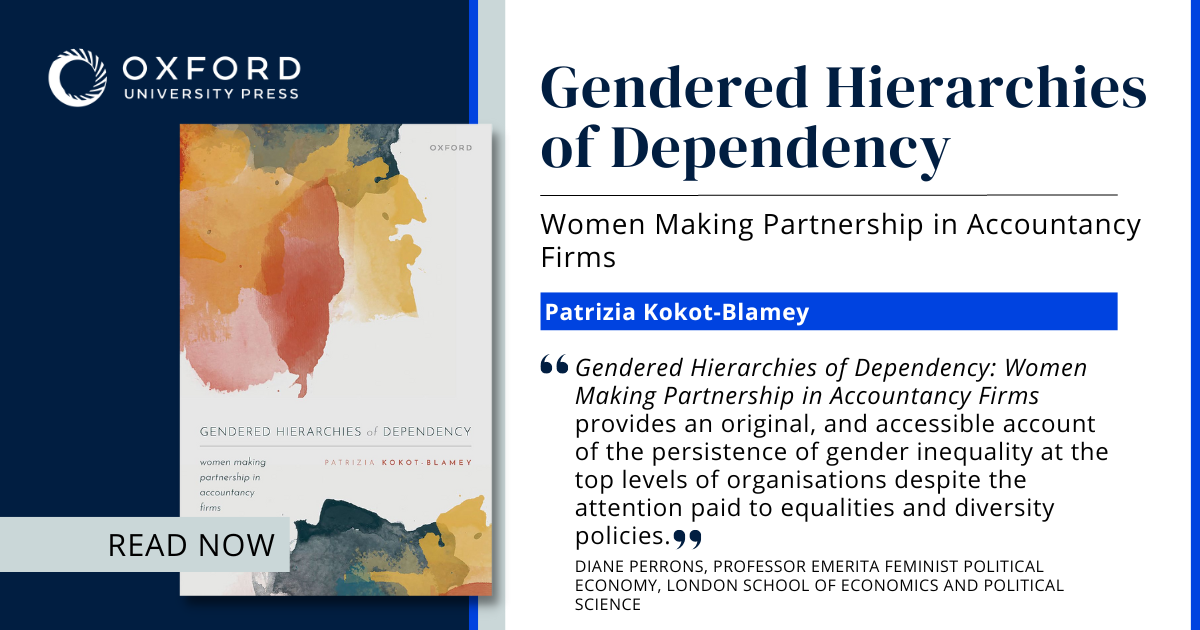Gender lessons from the top – How organisational hierarchies differ for women across borders
Professional service firms offer an important research site. The Big 4 firms alone employ 1.12 million people worldwide. They regularly feature among top employers for women and are involved in auditing and advising corporations and governments alike. While many of these firms invest heavily in initiatives designed to improve access and equal opportunities for women, the proportion of women at the very top has stalled at around 20%-23%. In my research with women who made partnership in professional service firms, I was especially interested in how organisational hierarchies are negotiated across borders, and the advantages and disadvantages for women.
The national context matters
My recently published book, ‘Gendered Hierarchies of Dependency’, shows the national context does indeed matter to women’s careers. In academia, we have models and frameworks to make sense of cross-national differences. One of the more established is Varieties of Capitalism (VoC), developed by Hall and Soskice in 2001. I use this in my work to help think about how differences in the socio-economic and political context are reflected in how we organise hierarchies at work.The VoC distinguishes between Coordinated Market Economies on the one hand, and Liberal Market Economies on the other hand. The main difference between them is how different actors – employers, workers, unions, the government etc – interact and how this interaction is coordinated. In Liberal Market Economies such as the UK, markets tend to coordinate things, while in Coordinated Market Economies (CMEs) negotiations and cooperation are key. For example, in CMEs such as Germany, companies may be encouraged to share R&D facilities. During economic downturns, the government, unions and employers are also more likely to negotiate collective solutions instead of layoffs for some.As a result, countries develop different competitive advantages. For example, radical innovation is more likely in Liberal Market Economies such as the US or the UK where markets are less regulated and competition encouraged. In my research, I show how this plays out in how organisational hierarchies are negotiated and that each context comes with different challenges that are often gendered. The findings can be useful for taking a strategic approach to cross-border work and understanding why everyday things we take for granted may be done differently, even when we just move 400 miles east.
Importance of networks and relationships in coordinated market economies
Examining the careers of women who made it to partnership in professional service firms, my book demonstrates how relationships and networks feature much more prominently in the careers of German participants. Importantly, such differences even came to the fore in large, globally-operating firms, although it was less pronounced here. It was quite common for example to draw on family friends to secure a first internship or advice throughout the application process. The women I spoke to often joined firms where they already had established networks. Partnership deeds were often discussed over dinner and for some, partnership was a relationship of trust that was almost akin to marriage.These sort of relationship-based hierarchies can be tricky for women. We know from decades of research that women are, on average, less likely to have access to networks of this kind, which are often dominated by men. It will also make it more difficult for expatriates looking to further their careers abroad, as they likely lack the relationships necessary to access the kinds of opportunities for responsibility and leadership we know can help advance careers on repatriation. There are other disadvantages. For the women I interviewed it was at times unclear how promotions were applied. They had to rely heavily on maintaining good relationships with one immediate manager. This can backfire if your manager is unsupportive. It can be especially problematic if your manager is biased.
Understanding performance management systems and signalling your market value
In the UK, in contrast, the research uncovered a more structured and proceduralised approach to careers and hierarchies. The women I interviewed described the importance of understanding the performance management system in place and accurately signalling their expectations and market value throughout the appraisal and promotions process. When things went wrong, they often relied on recruiters and headhunters to facilitate a move. Half of the women interviewed in the UK mentioned the involvement of headhunters and recruiters during their careers. Research results about the extent to which recruiters can help for example overcome gender bias in corporate recruitment processes are mixed, but what is clear is that they play an important role as gatekeepers in Liberal Market Economies and maintaining good relations with them is therefore advisable.In Germany, only two of the participants mentioned recruiters. In the rare cases where participants wanted to change firms, they had established good relationships in other firms themselves, which made securing a new position uncomplicated. But this was rare and many of the women I interviewed in Germany talked about the importance of working with those you trust and having long-term and established relationships, especially in an industry where hours can be long and where liabilities are shared between partners.
Trust, norms and boundaries
But such trust is a double-edged sword. It can help make work more meaningful and many of the women I talked to in Germany spoke of the pride they took in building a firm with people they knew well and enjoyed working with over a long period of time. They were very confident and secure in their roles. Trust also brings pressure to conform and expectations of reciprocity. This can affect what we think is possible and how we live our lives. It especially affects women, because we are often subject to quite entrenched expectations of what a ‘good mother’ looks like. For example, many of the women I interviewed in Germany talked about the needs of children for their mothers and that mothers should ideally work part-time. At the same time, making partnership was not seen to be compatible with parttime work, effectively excluding mothers.In contrast, in the UK, relationships at work were much more fleeting and often assigned and contained by the employer. Childcare was seen to be a private matter and in half of the cases where children were present, it was fathers who downshifted or gave up work entirely. It made navigating the professional hierarchy much easier because advancement is seen as everyone’s business. At the same time, the women I spoke to were much more aware of redundancies; even when working at the top of the hierarchy, some had suffered redundancy themselves.While long-term relationships of trust and their importance in the workplace can in some circumstances be stifling for women on the way to the top, they also bring meaning to our work and perceived as well as real job security.
Smoothing gendered effects
For me, there are three key lessons to take forward from this research that may help bring more women to the top. The first is that a transparent appraisal process is essential to help more women advance. Second, longterm relationships of trust are important to foster cultures of trust, which can bring meaning to our work and help facilitate a sense of job security – important for our physical and mental wellbeing. But these first two points can be in conflict. Promoting a performance culture where experience and tenure are dismissed can make it difficult for employees to establish trust between themselves. The third lesson is that 80% of women in the two countries I examined have children. For many women, spending more time with their children in the early years will be important. We see this by the high number of women downshifting their careers every year. Making it to the top should not come at the cost of forgoing motherhood entirely or having to work like fathers have traditionally done. Organisations have the capacity to create employment that can be mindful of the human life-cycle, especially as careers are long games, with many of us today expecting to work until our 70s.
Save 30% on Patrizia’s book

Order ‘Gendered Hierarchies of Dependency‘ by Patrizia Kokot-Blamey online at https://global.oup.com/academic, with promotion code ASFLYQ6 to save 30%.






